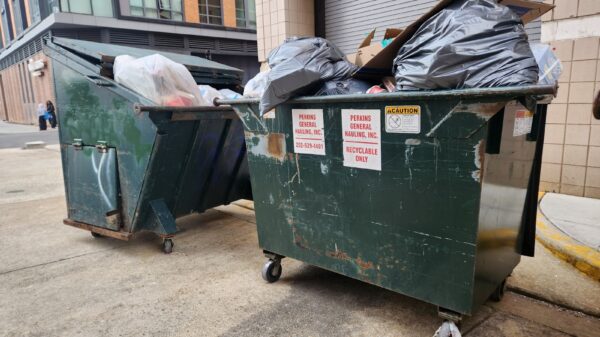An interesting third week of jury selection wrapped up this past Friday, Jan. 20 in rapper Young Thug’s Racketeer Influenced and Corrupt Organizations (RICO) trial. The famed rapper is among 28 people named in an indictment that alleges defendants committed 56 crimes under the guise of a local street gang, Young Slime Life (YSL).
Security camera footage obtained by WSB-TV shows Thug and another co-defendant executing an alleged drug deal amidst court proceedings. The co-defendant, Kahlieff Adams, walked to Young Thug unattended and shook his hand, ultimately handing over a percocet. The record alleges Thug attempted to conceal the painkiller under the table before being caught by the judge.
Adams was later found with more contraband including marijuana and tobacco, racking several other charges in addition to the racketeering case.
Thug and his defense have maintained his innocence in the situation. He has not been charged for the incident.
Born as Jeffrey Williams, the rapper was arrested back in May alongside 27 co-defendants including fellow peer, Sergio Kitchens, whose stage name is Gunna.
The RICO Act is used to target organized crime and its charges are applied to those who participate in a pattern of criminal activity “motivated by or resulting in” monetary gain. Offenses include but are not limited to: racketeering, homicide, drug trafficking, theft and bodily injury, all of which YSL is accused of in the prosecutor’s 88-page indictment.
Prosecutors have framed Thug as ‘King Slime’ alleging that he led YSL gang members to commit violent crimes to make money and gain power. While the artist’s criminal history is controversial, Thug’s impact on music, fashion and culture is undeniable.
Also known as Thugger, Williams rose to popularity in 2014 after his hit single, ‘Stoner.’ The Atlanta native has worked with artists across all genres including Travis Barker, Kanye West, Childish Gambino and Lil Baby.
Lyric Jernigan, a junior health sciences major says though she doesn’t listen to Thug regularly, she admires the diversity he brought to the rap scene.
“He just brings something different that we didn’t see from a lot of male rappers when he first came out and as far as masculinity goes, he beats a lot of those stereotypes as well,” Jernigan said.
“I see him in the same light as, like, A$AP Rocky in terms of fashion, so sometimes I feel like I’m able to separate his music and what he wears and the different fashion shows he’s participated in,” said Howard University Philadelphia Club’s co-president, Tori Lane.
Williams founded Young Stoner Life Records (YSL), a music ensemble under 300 Entertainment in 2016. YSL Records is responsible for big names within the Atlanta rap scene like Gunna, the late Lil Keed, Slimelife Shawty and Karlae.
The #FREETHUG movement has been spearheaded by Atlanta natives who hold Young Thug especially close to their hearts.
“Young Thug paved the way for a lot of rappers in Atlanta,” said fourth-year student Kayla Holden. “I feel like he took them under his wing and showed them the way.”
Marlyn Reed, a human performance major from Atlanta, listens to Young Thug almost every day.
“I feel like with him, you could notice that he’s kinda like, free to be himself and he expresses himself in a way that other male rappers don’t do,” Reed said. “You can see a lot of his influence in [other rappers’] sound and in their music.”
An integral part of the high-profile case is the use of incriminating song lyrics as evidence. Prosecutors alleged YSL not only committed crimes but used their music, social media platforms and clothing merchandise to promote them.
“I think if you decide to admit your crimes over a beat, I’m going to use it,” said the Fulton County attorney, Fani Willis, back in an August press conference.
YSL’s case will set the precedent for how art and cultural expression are interpreted by law in the future.
“It’s freedom of speech,” Jernigan said. “I feel like it may be prejudice in a sense because if it was a white boy and his lyrics, would they be doing all of that?”
300 Entertainment co-founder Kevin Liles launched a petition in response to song lyrics incriminating defendants on trial. The Protect Black Art Movement has garnered attention from across the world, engaging both rap fans and industry leaders. The petition has over 80,000 signatures to date.
When asked about her feelings on the matter, Holden asked, “When people make films about murders, does that mean the director wants to murder someone?”
“Not everyone who raps about killing someone is actually killing someone,” continued the nutritional science major.
“Even with YSL as a music group, even if people are claiming that they’re a gang and stuff, they still do good things in the community,” Reed said. “So if they’re doing good things and they’re putting YSL on merch, they’re not necessarily promoting violence.”
If convicted, Thug and friends face up to 20 years in prison.
As for the future of trap music, the pressure from the justice system may inspire artists and record labels to get more creative with their lyrics.
“I feel like if they’re living that lifestyle they’re probably going to keep living it,” Reed said, but she speculates rappers will “be more strategic about how they do it.”
Jernigan shared similar sentiments. “They could even try to rephrase it by telling a story about someone or something else,” said the third-year student.
Holden speculates Thug’s fans will continue to advocate for his release with clothing, social media and music. “I feel like our generation is also very creative and expressive so if they like Young Thug, they’re going to drop merch saying #FREEHIM, or we take an opportunity and run with it.”
The jury selection process is expected to last through February.
Copy edited by Chanice McClover-Lee
































